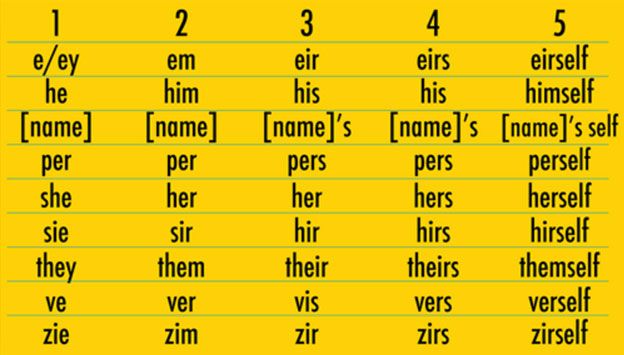JONATHAN TURLEY / 2016-09-29 08:02
 The University of Michigan this week have issued a new directive to faculty that they must accommodate students in their preferred pronouns, including "they" and "ze." Those pronouns will appear on class lists and professors are told to acknowledge any mistaken pronoun use and correct the mistake as "one of the most basic ways to show your respect for their identity and to cultivate an environment that respects all gender identities." That may not sit well with faculty who have deep-seated objections to the use of pronouns like "they" to refer to a single person as a matter of personal, religious, or intellectual matter. However, the university added that "If there were a persistent pattern of ignoring a student's preference, we would address that as a performance matter."
The University of Michigan this week have issued a new directive to faculty that they must accommodate students in their preferred pronouns, including "they" and "ze." Those pronouns will appear on class lists and professors are told to acknowledge any mistaken pronoun use and correct the mistake as "one of the most basic ways to show your respect for their identity and to cultivate an environment that respects all gender identities." That may not sit well with faculty who have deep-seated objections to the use of pronouns like "they" to refer to a single person as a matter of personal, religious, or intellectual matter. However, the university added that "If there were a persistent pattern of ignoring a student's preference, we would address that as a performance matter."
As we have discussed, other universities have also made this change away from traditional pronouns. Harvard did so last year.
There is a growing list of different gender identifications. Indeed, I was only informed this week by my high school boys that I am now "cisgender," or someone whose gender matches their "assigned" sex at birth (ie someone who is not transgender. There are also transgender (different from their assigned sex at birth); non-binary (a person who identifies as neither male nor female); genderqueer (which appears to be like non-binary); and genderfluid (a person whose gender identity changes over time).
Those new designations have led to an equally elastic list of pronouns. So at the University of Vermont, students can choose "he," "she," "they," and "ze," as well as "name only." Other options are captures on the University of Wisconsin-Milwaukee card given to faculty and students:

The question is whether the faculty have the right to object to such pronoun changes as a matter of personal beliefs. Clearly the universities view this as a matter of binding and uniform policy for all employees. For the perspective of the administrators, gender identifications other than the traditional "assigned" genders are recognized in antidiscrimination laws and thus failing to recognize the differences is akin to claiming the right racist speech. That could lead to some interesting conflicts over personal and academic freedom.
What do you think?
Filed under: Academics, Bizarre, Politics, Religion, Society
Shared via Inoreader
Sent from my iPhone
No comments:
Post a Comment